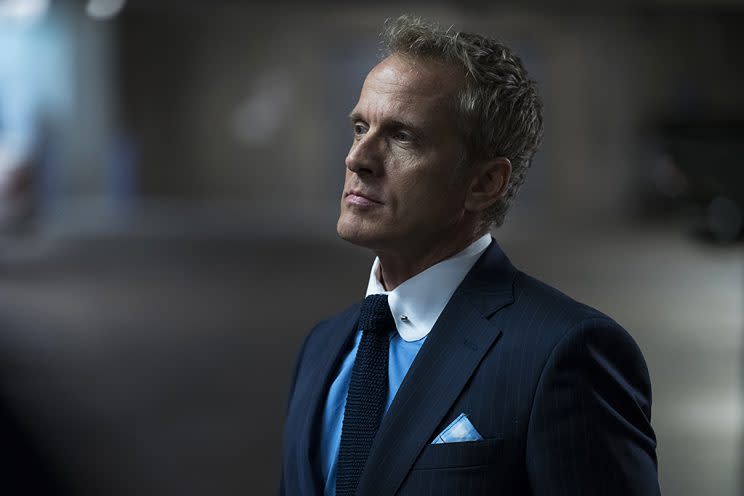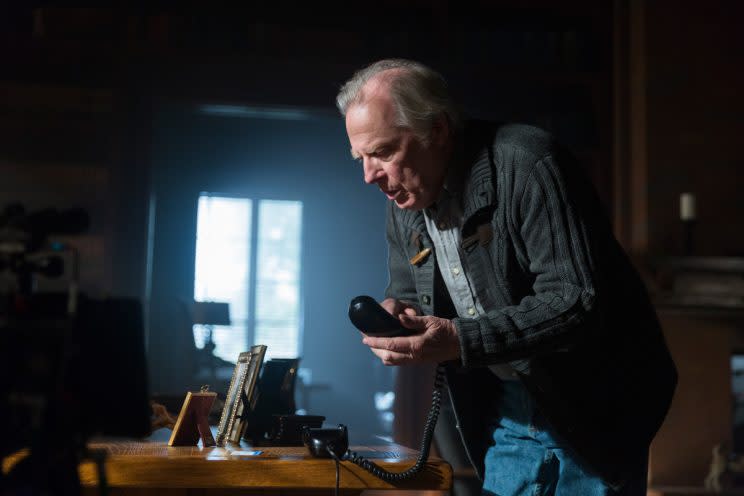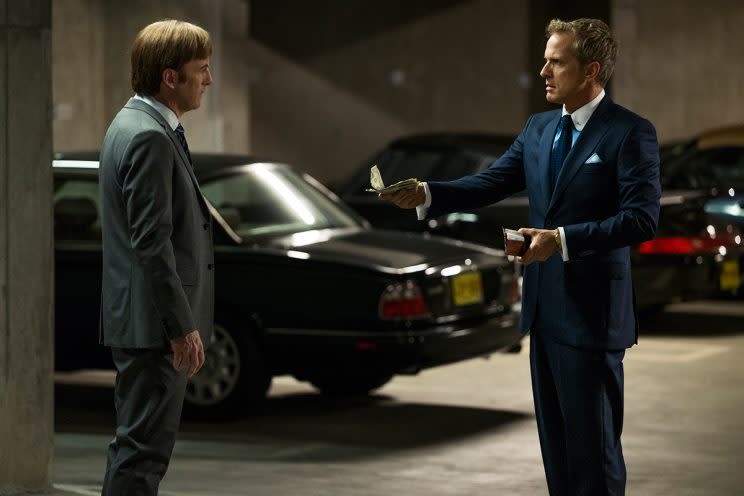‘Better Call Saul’ Postmortem: Patrick Fabian Talks About the Moment Chuck ‘Gobsmacked’ Howard

Warning: This interview for the “Lantern” Season 3 finale episode of Better Call Saul contains storyline and character spoilers.
Before Chuck McGill tried to push brother Jimmy out of his life with the false, but still hurtful declaration that he’d never really cared about Jimmy, Chuck’s former law partner and friend Howard Hamlin did some dismissing of his own in the Better Call Saul Season 3 finale. With Chuck threatening to sue Howard and HHM — after years of loyalty and support from Howard during Chuck’s ongoing health issues — Howard was finally pushed to the edge, where he gathered up his own and borrowed cash to issue Chuck a $3 million check that said Howard just wanted Chuck to go away.
Howard portrayer Patrick Fabian talked to Yahoo TV about the specific moments that pushed the Hamlindigo Blue creator to sever his personal and professional ties to Chuck, and how he thinks Howard might find himself facing off with the other McGill next season. And he also tells us the very special guest who visited his home to view the Saul Season 3 ender with him.
That was the spectacular finale we knew it would be.
Thank you. You know what, it’s a funny thing, when you’re working on it, you don’t always know. It’s that weird thing… you’re just in it, and then you sort of forget about it. Then to finally watch it is really a treat. We got a lot of great response last night from it, and I was thrilled. I was thrilled to watch it, but also sad. I watched it with Rhea Seehorn last night.
You both had huge moments to wrap up the season.
Yeah! It really is when you see it like we shot it. I saw the script and everything, but then when you see it in its totality… I can’t say enough about Dave Porter’s music. His music, it’s always like the fifth Beatle on the show, but the mood he sets when we’re watching Chuck descend into madness is just so pitch perfect, pardon the phrase. I was really made aware of it a lot [in the finale]. So shout out to Dave Porter, without a doubt.

Did you and Rhea have a little viewing party?
Yeah, I had them come over to the house, her and her fiancé Graham came over. I made a dinner, and we hung out and chatted, sort of recapped. Rhea and I hang out a lot when we’re in Albuquerque, but it’s a funny thing, like when you’re on vacation you do all those things, but then when you get home, her life takes over, my life takes over. Mine becomes about making turkey sandwiches and getting kids to school. So it was a real great moment to sort of recap and sit there and watch the finale together.
What was your reaction to the ending?
The image of Chuck not moving, just sitting there… then the speed in which the flames start to engulf the house. It’s that thing, you’re almost hoping in that last frame he comes running out, he comes bursting out of the windows. Instead, there’s that certain dread of, “Oh no, he’s not going anywhere.”
Delving into Howard’s part of this whole story… in the meeting at HHM, when Chuck offers his hand to Howard, Chuck seems certain Howard is going to accept it, and things will go back to normal. Howard doesn’t shake his hand. He doesn’t even look Chuck in the eye before clearing the room. For Howard, what was the exact point where their relationship, business and professional, was just done?
First of all, somebody on social media said Bryan Cranston has, “Say my name,” and Patrick Fabian now has, “Can we have the room?” I thought that was right. That’s about as vicious as you can get for Howard: “Can we please not have a public viewing of what we’re going to do?”
You know, it goes back to Chuck suing me. It goes back to the letter that I received, but even that feels like Howard was still grasping at, “No, no, he doesn’t mean that, because Chuck would never sue the firm.” [But] when Howard goes over to his house and Chuck says, “You think having me as a partner’s a problem, try having me as an enemy”… it’s that point, I think, when Howard is gobsmacked. As Chuck even says, “What else is there to say? Except, I’ll see you in court.” It is such a stab in the back. I think it really blindsides Howard, and it makes Howard do something that I think we all agree, on some level, he would never want to do, which is use his own money, right? I really heard it last night. He’s using his own money, and he borrowed money, and that’s just the first of three payments. Even though I said those words, I don’t think it really resonated with me as much [until I watched it], and I thought, “Oh wait, where is he going to get this other money? If this is him tapped out right now, what’s going to happen?”
There’s a degree of marriage between Chuck and Howard… our marriage vows are the way we comport ourselves both in business and personally, but we both know that the tacit agreement is that HHM is all. We both believe strongly that the firm and the strength of the firm is where we derive our sense of self. So to all of sudden be presented with the reality that Chuck does not feel that way… I think it really just shakes Howard to his core, because that’s all he really has in that respect with Chuck. We don’t see them play tennis together. We see them do the things that men do when they are titans of business together. We see him have scotch together and celebrate monetary victories and suits. And to have that just taken away… as you said, with Chuck and his handshake… he comes strolling down after pontificating, and sticks his hand out, because he’s covered all the angles. He’s covered it all, he thinks. [But] in this respect, he has not. This is one time when he has absolutely not covered it all. It’s the one thing he thought I would not do, the one thing that I can do and actually, gladly do; it’s a set up. It’s a set up from the time that we’re in his kitchen and he says, “Do you want me as your enemy?” At that point, whatever is going to play out…
Clearly we had phone calls. Clearly he said, let’s have a meeting. We had mediators, and we show up. We have this meeting, but I have this all pre-planned. Check’s in my pocket. I’ve got people waiting; at 10:15, everybody has to be out in the lobby for a very special Howard Hamlin announcement, and they are. So then I get to sort of publicly bootstrap him and hamstring him, right? When I get to turn to him, and say “Do you want to say anything?” I know there is nothing. He is caught, and that’s mean. That’s mean, mean, mean, mean, mean. That’s Howard being as mean as he can, I would say. It’s bloodless at that point.

Insisting on that scene with the whole firm saying goodbye to Chuck, was it also to kind of cement, “Hey, you officially don’t exist here any longer. You are gone”?
Absolutely. It is literally a, “Don’t let the door hit you on the way out.” I imagined that while Chuck is sitting in the office with us getting ready to tell us what he thinks we should do, somebody is cleaning out whatever is left of his office, completely. It’s already been put in a car. There are security officers standing by. It’s that whole… we’ve seen it in movies, the corporate [executive] being escorted out. Chuck’s being escorted out, literally, by 200 employees, and there’s nothing he can say after I announce what I announce. There’s nothing he can say to counter it. What could make Chuck more upset than not being the smartest boy in class?
You and I talked earlier this season about how little we really know about Howard. We actually found out a few new details since: how Chuck joined up with Hamlin Sr. when the firm was small, how he helped turn it into what Howard says in the finale is one the biggest firms in the state. One of things that I think we can take from that is just how big a role Howard must have played in that, because we know Chuck is arrogant and prickly and dealing with his illness probably made building the client base difficult sometimes. Howard has almost certainly been the public face of the firm, helping it grow during a lot of that time.
Absolutely. When Chuck’s in his kitchen and he says, “I made this firm,” that’s one side of the story. That’s one person’s interpretation of the facts. Of course, Chuck is going to see it like that. “I helped your struggling father, and I made it into this thing.” There is zero evidence that in the world of business, the charm and the social graces, that Chuck is anything other than uncomfortable in those moments. So I agree with you.
And the other thing: Howard goes ahead and stakes his claim. He has played second fiddle to Chuck, willingly, for the past three seasons in many, many ways. He has hurt his own reputation. He has sucked up his own ego. He has done all this stuff for the benefit of Chuck, for the benefit of Chuck, for the benefit of Chuck. Eventually, he finds out Chuck’s only benefit is for himself as well. That’s a come to Jesus, white light moment for him. All of sudden, I think Howard realizes there are two moments: in the courtroom, where he tells Chuck, “You don’t have to testify,” because there’s a part of Howard that has a logical suspicion that maybe this is not all on the up and up. Then we witness the battery moment, and at that point Howard has to go ahead and say, “Alright, everything that I’ve nurtured and coddled with this space blanket stuff has to be put away, because this clearly is not the case. I don’t know what this is, but it’s not that.” At least I don’t think Howard believes it’s that at that point.
Then the second time is when he realizes Chuck no longer gives a sh*t about the firm. At that point, hat in hand, Howard has to go ahead and marshal his own finances just to get rid of Chuck. That act alone, the idea of Howard Hamlin calling up someone… because he doesn’t say he takes a bank loan. So my assumption is that he has gone to somebody who has deep pockets and maybe has even explained the situation a little bit, and said, “I need to buy out Chuck”… that was a public humiliation, and so I imagined that was tough for Howard to do, but that he was willing to do, i.e., get dirty, in order to get rid of Chuck.
With Chuck gone from the firm — and perhaps the world — Howard’s only ongoing tie to Jimmy is the Sandpiper case. So what do we think that means for Howard’s future, for the firm’s future? Are we going to get to see all of that play out?
[Laughs.] Are you asking if Howard’s going away to someplace special?
I hope not!
Yeah, you know, I hope not as well. There’s multiple things. If there’s money issues for both Jimmy and Howard… there is money floating around in Albuquerque. We know this. So maybe that becomes an entanglement somehow. Or given Chuck’s fate, vengeance and finger pointing also seems to be in the works I would imagine… assuming that Chuck is gone completely, then there is nobody to give his side of the story. You start fighting wolves for scraps of who’s going to construct the story that’s going to be told, that’s going to end up being “the truth.” It’s like history; the victors write the history of how things go down. So who’s going to be the victor in this?

Will Howard have any guilt about Chuck? Whether Chuck is dead or alive, just knowing about his meltdown and the fire, would Howard second-guess forcing Chuck out of the company? How do you think he’ll react to that?
Howard is not soulless. He’s not heartless at all. I think absolutely he would feel remorse and guilt if he felt that he was the instigator of all that, but I would also go back to the conversation we just had. Chuck really forced his hand. Chuck put him in an untenable position. Chuck would see that with utter clarity and dispassionate facts. He would be able to divorce his own emotion from the situation to see that Howard made the right play. He did the right thing for the firm. Of course, that’s easy for me to say. I’m not sitting in a burned-out house.
Read more from Yahoo TV:


